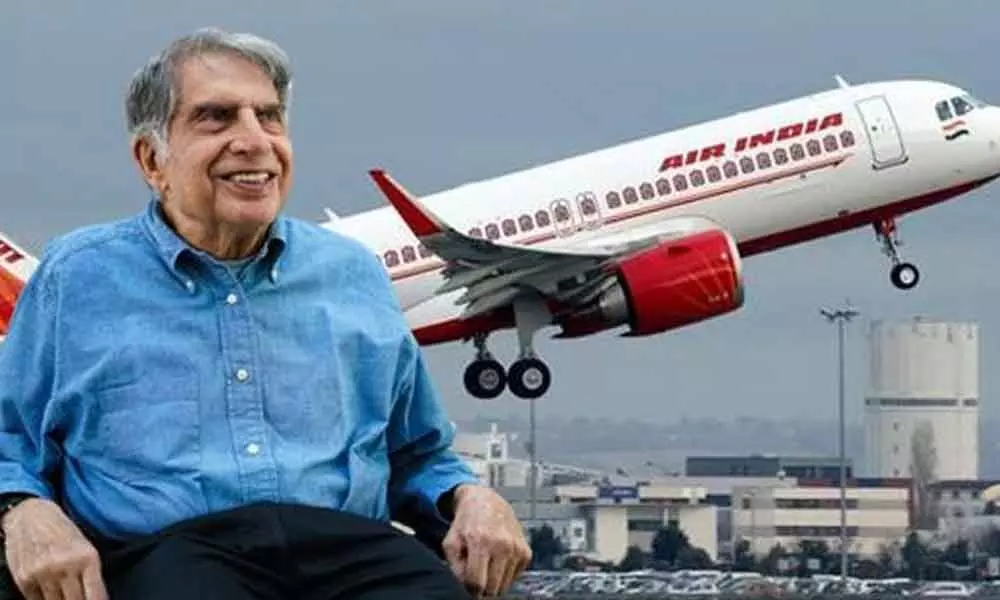Air India back under Tatas wings

Air India back under Tatas wings
Salt-to-software conglomerate Tata Group on Thursday took over Air India and vowed to turn the loss-making carrier, it had founded but had lost control nearly seven decades back, into a world-class airline.
New Delhi: Salt-to-software conglomerate Tata Group on Thursday took over Air India and vowed to turn the loss-making carrier, it had founded but had lost control nearly seven decades back, into a world-class airline.
N Chandrasekaran, Chairman of Tata Sons, which in October last year beat a consortium led by rival SpiceJet promoter to win the bid for the national carrier, first called on Prime Minister Narendra Modi before heading to the Air India office where the takeover formalities were completed.
A new board of directors met shortly thereafter, formalising the management takeover. Both the government and Tatas made separate announcements of completion of the transaction — the first privatisation in nearly two decades that will put an end to thousands of crores of taxpayers' money being provided over the years to keep the airline afloat. For Tatas, Air India will be the third airline. It already operates Vistara in joint venture with Singapore Airlines and AirAsia India in partnership with AirAsia Group.
The Union Finance Ministry in a statement said the Air India strategic disinvestment transaction has been completed with the government receiving Rs 2,700 crore from Talace Pvt Ltd, a wholly-owned subsidiary of Tata Sons.
Tatas took over Rs 15,300 crore of debt in Air India and Air India Express Ltd while the remaining Rs 46,262 crore loan plus an outstanding of about Rs 15,000 crore towards unpaid fuel bills were paid off by the government.
"It is indeed noteworthy that the disinvestment process of @airindiain has been brought to a successful conclusion in a time-bound manner," Civil Aviation Minister Jyotiraditya Scindia tweeted. That proves the government's ability and "the resolve to carry out disinvestment effectively in non-strategic sectors in the future."
Air India will give Tatas immediate access to valuable flying rights and landing slots and it will also gain control of low-cost, short-haul international carrier Air India Express as well as a 50 per cent stake in a ground handling company with SATS Ltd.
With Rs 20 crore daily loss and a market share that more than halved to less than 10 per cent last year, Tatas have their task cut out as it has to not just repair the shabby customer services at Air India but also deal with highly unionised and surplus manpower as well as an ageing and a mixed fleet of 141 aircraft.
Tatas cannot retrench any employee for at least a year, according to the terms of the deal.
Air India's regional arm, Alliance Air, is not part of the deal.
In a tweet, Department of Investment and Public Asset Management (DIPAM) Secretary Tuhin Kanta Pandey said the strategic disinvestment transaction of Air India has concluded successfully with transfer of 100 per cent shares of Air India to Talace along with management control.
"A new board, led by the strategic partner, takes charge of Air India," Pandey said after completion of the handover process at the airline's headquarters here.
In October last year, Tatas won the bid for Air India through a competitive bidding for Rs 18,000 crore, including the cash component of Rs 2,700 crore.
"We are excited to have Air India back in the Tata Group and are committed to making this a world-class airline," Tata Sons Chairman N Chandrasekaran said in a statement. "I warmly welcome all the employees of Air India to our Group and look forward to working together".
Tata Group Founder JRD Tata had originally launched the airline in 1932 as the nation's first carrier, flying mail between Karachi in then-undivided, British-ruled India and Bombay. It was nationalised in 1953.
The Maharaja once shone brightly in Indian skies but competition from the private sector coupled with faulty decisions on aircraft purchases, heterogeneity of fleet and a failed marriage with Indian Airlines led to its downfall.

